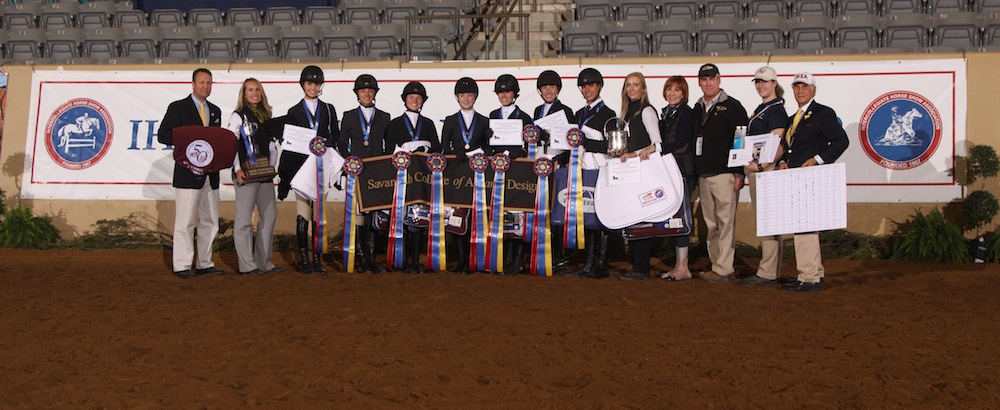
National hunt seat Champions in 2017, from the Savannah College of Art and Design. PC: Al Cook
We’re beyond thrilled to announce that Jumper Nation has partnered with some rising stars of the Intercollegiate Horse Show Program (IHSA) to share their seasons in the saddle and what the full lifestyle entails. But before we introduce you to some of the riders, it’s helpful to know the ins and outs of IHSA itself. Here’s an IHSA cheat sheet to help you nail the final:
The IHSA was started in the late 1960s by Bob Cacchione in New Jersey, and his passion is the real spark behind the program’s existence. (There’s a terrific article with more background on Bob here.) What started as a single school’s riding program mutated into local teams and has now grown into more than 350 teams with over 8,000 athletes across North America.
The critical philosophy that sets IHSA apart from nearly every other showing organization is that by pairing with Universities in this manner, student athletes can train and show with less of the financial burden that accompanies equestrian life.
How do they manage such an incredible feat?
- Most students train on horses owned by the team / institution. Riders generally do not take their horses with them, and the playing field is leveled at shows, where competitors will ride unfamiliar horses provided by the hosting team. Your horse for the class is determined at random.
- Free or subsidized coaching. Team coaches provide top notch instruction and travel with the team to shows, meaning no rider is “on their own”, but instead part of a larger, greater tradition and set of values.
- No personal tack. No CWD saddle? No problem. The team provides tack and gear that’s sufficient for both the comfort of the horse and rider.
- Modest Entry Fees. Show fees are modest, and in some cases, the institutions finance the fees for their teams.
Each team is different in terms of how its funding and horses are managed so the availability to ride and show for less/free can vary, but if you make the team with the right institution, the opportunities can be truly significant.
Many riding teams are supported by generous university donors and partnerships with local riding barns. The IHSA itself is also supported by numerous partnerships with the USHJA, the USEF, AQHA, and numerous retail sponsors.
All of these symbiotic relationships allow the sport to flourish during years where horses would otherwise often fall to the wayside for many students. Many riders who could be devoted to showing year-round in their teens suddenly head off to the life of academics, jobs, and new social life opportunities, and horses take a backseat.
But the IHSA allows the candle to keep burning, introduces the sport to new folks (they have divisions all the way down to walk / trot for new team members), and can get equine-focused students through the academic system who might have otherwise skipped higher education.
Other important things to know to understand the IHSA:
- The IHSA supports both english and western disciplines, and many riders compete in both.
- Schools compete in regions, then can qualify for zone competition (similar territory to the zones used in the USHJA) and finally compete at Nationals, which rotates locations each year for accessibility.
- Teams can be small or big, and different sizes can compete against each other because only a handful of pre-selected riders are riding for “points”.
- Horses and riders get virtually no familiarization time. Other than asking the hosting facility questions about the horse before mounting, you head straight in for catch rides in all the disciplines and learn as you go.
- They have some pretty illustrious alumni, including Beezie Madden and Peter Wylde.
- They are separate from the NCAA Equestrian Programs, which have their own competitions, funding, and recruitment processes.
You can learn more about the IHSA at their website or follow them on Facebook, and we hope you’ll join our riders for the journey this year as they compete with their respective universities!
Go IHSA, and Go Jumping.
